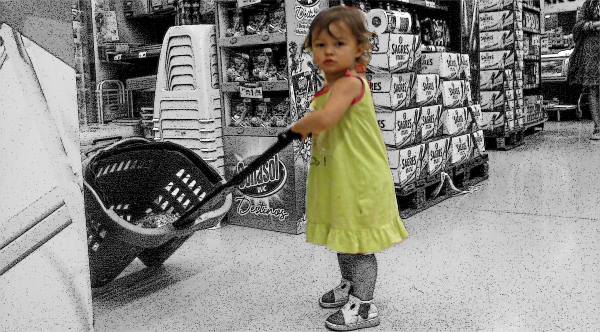Most activists are frustrated when their opponent in a debate reduces citizen influence to consumer choices. They can’t stand people who still live in their liberal fairy tale world where the consumer votes with her wallet and from the sum total of consumers, in good Rousseauian fashion, emerges the volonté generale and determines the destiny of our society.
They are frustrated because consumer choices are framed. They are almost always choices between two evils – the brand names of the top two soft drink or fast food corporations serve to illustrate this.
They are frustrated because voting with your wallet is so excruciatingly slow and inefficient. The “masses” seem to be immune to calls to a boycott that really hurts, because it almost by definition means it hurts both sides.
The myth of change from within
Are we held hostage by large corporations, or is that image part of the ideology too? The idea that the system can by definition not change from the inside serves corporations rather well. It tells us that we cannot vote with our money so we might as well give in to the drizzle of advertisements and consume to our heart’s content.
At the same time, corporations are terrified by public opinion and we know they do everything within their power to influence or manipulate it. They are afraid of the emergent quality of a “public” consumer choice, rather than the sum total of what each of us chooses to consumer. They have accurate statistics to measure large groups of individuals. As long as the relevant variables are not correlated, a statistical error is the best we can hope to achieve with our consumer choices.
We should call this the real Social Contract. Corporations are allowed to do everything to produce as long as they sell their products on the free market. This contract enabled a competition in a way that is much more civilized than history has ever seen. It also went terribly wrong when it got a life of its own and spiralled out of control to the point where its interest are diverging at an ever faster rate from what our species needs.
The consumer as a product
The fatal flaw in liberal ideology is that it assumes the autonomous consumer. One doesn’t need to read Hegel’s Phenomenology of Spirit to understand that Corporations produce their consumers. Systemically the moment of freedom the consumers experience is part of the product. We thus have the ability to change part of the product by changing ourselves.
This may sound like mere semantics, but it sheds a light on our true influence as consumers, which we have to the extent that we are ourselves a product. The venture capital style sharing economy has discovered the consumer-as-a-product. It essentially matches people with each other and relabels the transaction as a “service” they provide. Consumers are sold to each other and the tribute is paid to a “brand”. It is in the interest of the brand to push material consumption. A global brand will push those lifestyle changes that increase the interaction with that brand. More Lyft/Uber taxi rides, more AirBnb nights, more consumption of free media to “enhance” exposure to advertising and paid service offers.
The real peer-to-peer economy, on the other hand, has no such incentive to push lifestyle changes towards more-of-a-kind. It reduces the might of the middleman and thus cancels his profit-seeking agenda. Peer-to-peer transactions cannot be branded. The lifestyle changes sparked by a true p2p platform are perhaps more genuine, in the sense that they are not pushed by revenue-seeking corporations wielding powerful brands, and are a much better way to decrease overall resource consumption.
